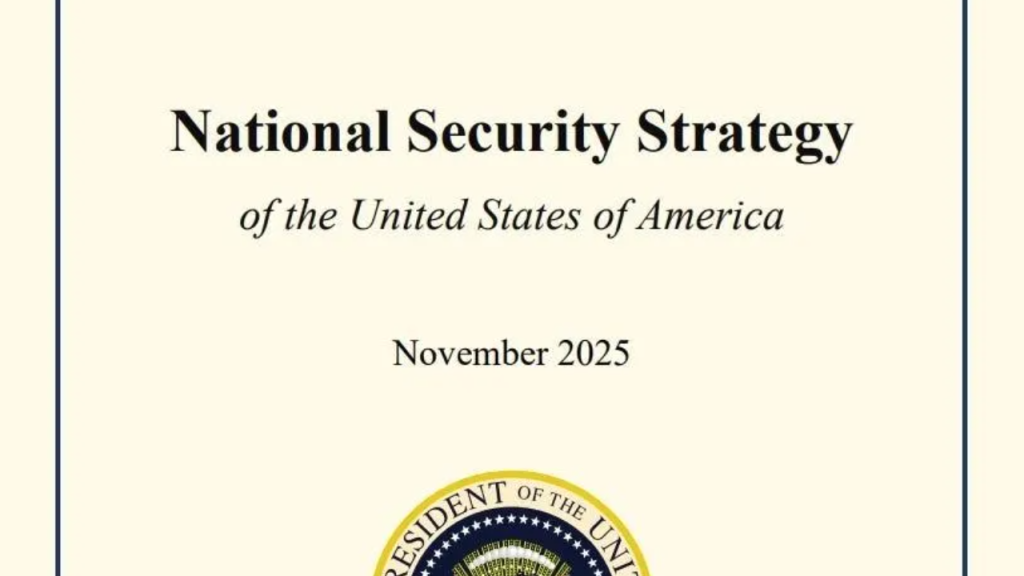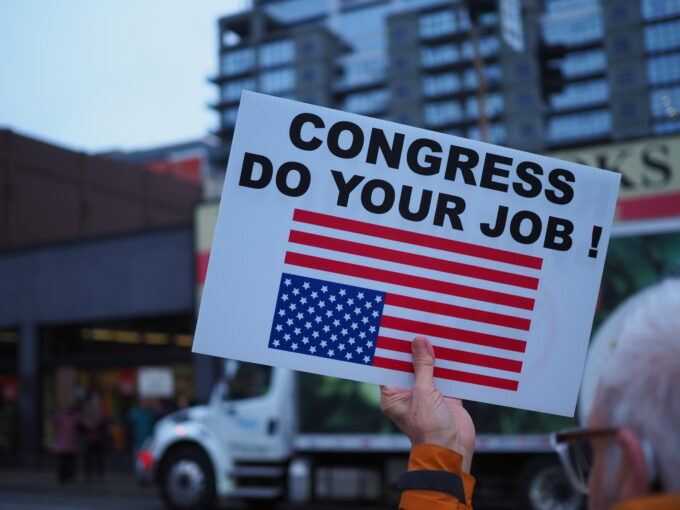First published at CADTM.
The publication of the new US national security doctrine in early December 2025 marks a sharp break with the past due to its openly militaristic, authoritarian, and ideologically reactionary nature. Under the guise of strategic realism, the Trump administration is now embracing a logic of unapologetic imperial dominance, fuelled by neo-fascist references, climate denial, and an explicit rejection of human rights and multilateralism. In this Q&A, Éric Toussaint analyses the document, placing it in its historical, economic and ideological context. He highlights the major implications for international relations, the people, and emancipatory movements.
Can you put the White House’s publication of the new US international policy doctrine into historical context?
The publication of this document in early December 2025 must be seen in the context of what Gilbert Achcar calls the New Cold War, which he analysed in his book of the same name. Gilbert Achcar traces the beginning of a new Cold War back to the late 1990s, when the United States embarked on NATO expansion by accelerating the integration of former Eastern Bloc countries and extending its area of intervention to include the countries of the former Yugoslavia and, a few years later, Afghanistan. Gilbert Achcar clearly shows that the choices made by Washington were debated among US strategists and that the hawks prevailed, knowing that their actions could only provoke negative reactions from the Kremlin. Vladimir Putin, at the head of Russia, developed a Great Russian chauvinism with the desire to increase his sphere of influence or control over former parts of the USSR, with references to the past greatness of Tsarist Russia.
With Donald Trump’s return to the White House in early 2025 for a new term, Washington’s aggressive policy of more than 25 years is taking an even more pronounced turn. The dramatic increase in military spending, which started internationally more than a decade ago, is currently undergoing a significant transformation.
Those on the left who, over the last few decades, have claimed that the global capitalist system had moved beyond the classic stage of imperialism and that we had entered a new era of super-imperialism led mainly by multinationals, whose ties with their countries of origin had been profoundly altered and weakened, were mistaken.
The policies of the most powerful states continue to dominate the evolution of the capitalist world. The so-called virtuous phase of globalisation (according to the apologetic version, popularised in particular by the Davos Forum and most governments), with the internationalisation of production chains including China and the G7 powers (and partially Russia, which was part of the G8 until 2014–2015), and the increase in free trade, is behind us.
Numerous armed conflicts have punctuated history since the Second World War, including during the short period (part of the 1990s) following the Cold War, and they have intensified during the new Cold War that began in the late 1990s.
The major imperialist powers, led by the United States, have resumed the path that leads to international, even global, wars. Russia’s invasion of Ukraine in 2022 has provided Washington with arguments to accelerate and intensify its war policy.
Russia, led by Vladimir Putin — a second-tier capitalist and imperialist power with nuclear weapons and vast fossil fuel resources — could take advantage of the failures of the United States and NATO in Afghanistan and the Middle East to carry out a massive invasion of Ukraine in 2022. But he miscalculated from his perspective and did not foresee that the Ukrainian people would resist massively. Putin thought that Zelensky’s regime (which is a neoliberal regime applying the recipes of the IMF and the World Bank) would collapse and that military victories would be quick and irreversible.
The Western imperialist powers prioritised their own interests, leading to the strengthening of NATO with the accession of Finland in 2023 and Sweden in 2024. On the other hand, sanctions against Russia have had little effect, and the ongoing war is being used to justify a massive increase in military spending by Central and Western European countries and a reactivation of their armies’ combat and deployment capabilities abroad, all under the unchallenged and arrogant leadership of Washington.
For their part, the United States, under Trump’s leadership during his second term, considered that their offensive should not be directed against Russia but rather against China, which represents a competing power that is far more powerful economically and politically than Russia. This is clearly stated in the National Security Strategy document released in early December 2025 by the government in Washington.
How do economic problems exacerbate tensions?
Global capitalism is in crisis and has been unable to return to a sustained pace of growth, to the point where we can speak, as economist Michael Roberts does, of a long depression. We are not at all advocates of growth, but from the point of view of capitalism, the inability to return to sustained growth is a real problem in terms of ensuring the massive accumulation of profits. This crisis, particularly acute in the former imperialist powers (the G7), exacerbates tensions between the bloc dominated by Washington and China, which is maintaining sustained growth, even if it is slowing down.
The preparation (and execution) of international armed conflicts is one of the responses that the capitalist classes of the various powers periodically use to find a solution to economic crises and to seek to expand or maintain their influence. We saw this repeatedly in the 19th and 20th centuries.
What does Trump’s strategy document say about the US military and the use of force?
Trump does not hesitate to adopt a belligerent tone:
We want to recruit, train, equip, and field the world’s most powerful, lethal, and technologically advanced military to protect our interests, deter wars, and—if necessary—win them quickly and decisively, with the lowest possible casualties to our forces. And we want a military in which every single service member is proud of their country and confident in their mission.We want the world’s most robust, credible, and modern nuclear deterrent, plus next-generation missile defences—including a Golden Dome for the American homeland—to protect the American people, American assets overseas, and American allies. (NSS 2025, p. 3)
In several places in the text, it is stated that the United States reserves the right to conduct military operations wherever it sees fit and to continue to use force to defend its interests. Trump also boasts in the introduction to the document about the military intervention in Iran against civilian nuclear facilities. He writes, ’We obliterated Iran’s nuclear enrichment capacity.’
During 2025, in violation of international law, he systematically resorted to force, whether in the Caribbean Sea against Venezuela (under the pretext of fighting drug trafficking), in Yemen, Syria, Nigeria, etc., not to mention, of course, his unwavering support for the Israeli army and Netanyahu’s neo-fascist government in carrying out a veritable genocide against the Palestinian people. In early January 2026, he ordered a large-scale military attack against Venezuela, kidnapped the presidential couple, had them taken to New York to be tried in the United States on false charges, and announced that he was taking control of the country’s oil resources.
When the Trump administration addresses the situation in the Indo-Pacific region, it is obvious that the United States is threatening to use force against China if Washington considers that its interests are at stake. We can see that it is preparing, as one of the possible pretexts for justifying military action, the need to maintain freedom of movement in the China Sea and elsewhere.
Does Trump not claim that the United States has footed the bill for the defence of its allies, particularly NATO member countries?
Indeed, Trump adopts a completely false narrative when he writes that previous administrations ’allowed allies and partners to offload the cost of their defense onto the American people (NSS 2025, p. 1).”
This is factually incorrect and serves to justify the pressure Trump is exerting on his allies, whom he treats as vassals, to accelerate the increase in military spending that they had already begun a decade ago. The statement appears on page 12 of NSS 2025:
President Trump has set a new global standard with the Hague Commitment, which pledges NATO countries to spend 5 per cent of GDP on defense and which our NATO allies have endorsed and must now meet. (NSS 2025, p. 12)
Indeed, as the public saw, NATO Secretary General and former Dutch Prime Minister Rutte said, more or less, to Trump at an Atlantic Alliance summit in The Hague in June 2025: ’Grandpa is right to get angry with his family members when they misbehave.’ This was a prime example of European vassal behaviour towards the president of the United States. And a month later, at the end of July 2025, EU President Ursula von der Leyen herself made a show of submission by visiting her suzerain’s lands in Scotland. She met with Trump on a golf course he owned to promise him that the EU would indeed buy more fossil fuels and more weapons from Uncle Sam and to submit to his will regarding the increase in customs tariffs.
A major misconception is that the United States’ allies, particularly NATO members, have benefited financially from Washington’s generosity. In fact, the United States maintains more than 220 large permanent military bases outside its territory in order to exert its dominance over a large part of the planet. In total, according to the Pentagon, the United States has more than 700 military sites in 80 countries, including more than 220 permanent military bases with a significant number of military personnel. US bases abroad account for 80% of foreign bases worldwide. This percentage is far more than any other country. For example, Russia has around 20 permanent military installations abroad, either in former Soviet countries or in Syria, with a total of 15,000 to 20,000 soldiers. China has only one permanent military base abroad, in Djibouti, with an official contingent of 400 Chinese soldiers.
The United States maintains more than 250,000 military personnel outside its territory at any given time, including more than 50,000 in Japan, 35,000 in Germany, 22,000 in South Korea, 12,000 in Italy, 10,000 in Great Britain
The United States maintains more than 250,000 military personnel outside its territory at any given time, including more than 50,000 in Japan, 35,000 in Germany, 22,000 in South Korea, 12,000 in Italy, 10,000 in Great Britain, and so on. As military personnel rotate, their presence represents a much larger total volume. Large capitalist companies in the United States derive enormous profits from this, particularly those in the military-industrial complex, as they supply military equipment and maintenance services.
Trump is lying to the American people by trying to make them believe that Washington has financed the protection of foreign allies with US taxpayers’ money. To calculate the net cost of the US presence abroad, we must consider what the United States actually spends on its military presence, including personnel, operations, and armaments. Many countries pay part of the cost of the US presence on their territory. Japan finances 70% of the US presence (or US occupation of its territory), Germany pays between 20 and 30%, Italy 30 to 40%, and the United Kingdom 20 to 25%. It is also essential to take into account the purchases of arms from American companies made by countries where US troops are present. According to the Stockholm International Peace Research Institute (SIPRI), 64% of European allies’ arms imports will come from the United States for the period 2020-2024 (Source: Stockholm International Peace Research Institute, SIPRI).
In any case, US military spending abroad directly serves its interests and does not represent any form of generosity or solidarity. The United States has carried out numerous military aggressions and interventions around the world, always in the interests of its large private companies and the US capitalist class. These interventions have served to overthrow or attempt to overthrow progressive regimes (Cuba, Santo Domingo, Vietnam, Grenada, etc.) or governments that have become inconvenient, such as Noriega’s in Panama, Saddam Hussein’s in Iraq, or the Taliban’s in Afghanistan. US military interventions since the end of the Second World War have been responsible for millions of deaths. They have enabled the United States to take control of territories that are particularly rich in raw materials, especially oil.
At the same time, how is it that Trump presents himself as a peacemaker?
Indeed, Trump presents himself as the president of peace, and it is worth starting with the passage in his text where he lists his supposed successes in order to compare the facts with his lies.
President Trump has cemented his legacy as a president of peace. In addition to the remarkable success achieved during his first term with the historic Abraham Accords, President Trump has used his negotiating skills to secure unprecedented peace in eight conflicts around the world during the last eight months of his second term. He negotiated peace between Cambodia and Thailand, Kosovo and Serbia, the DRC and Rwanda, Pakistan and India, Israel and Iran, Egypt and Ethiopia, Armenia and Azerbaijan, and ended the war in Gaza with the return of all hostages alive to their families.
In reality, the Abraham Accords in 2020 enabled Netanyahu’s neo-fascist government, with Washington’s help, to strengthen its international position by normalising relations with several Arab states: the United Arab Emirates, Bahrain, Sudan and Morocco. This has allowed Israel to strengthen the apartheid regime and further oppress the Palestinian people before moving on to the phase of ethnic cleansing and genocide.
While Netanyahu’s neo-fascist government is perpetrating genocide against the Palestinian people, which began in late 2023 with Washington’s full support (it started under the Biden administration), Trump has the audacity to claim that he has achieved peace in Gaza.
Trump’s claims of achieving other peace agreements are false; peace has not been established between Thailand and Cambodia, the DRC and Rwanda, or Israel and Iran. We also know that India does not accept the role Trump attributes to himself in the provisional end to the conflict between India and Pakistan in May 2025. We can’t say Egypt and Ethiopia are at peace since they never fought.
And in this passage, Trump does not mention the parts of the world where he is directly responsible for aggression, as is the case in Yemen, Venezuela, and Nigeria... Finally, he remains silent on the war between Ukraine and Russia, even though he promised that if elected, he would bring about peace in record time.
What is Trump’s stance on globalisation and free trade?
Right from the introduction, Trump criticises previous administrations and what he calls ’the American foreign policy elites’, who:
placed hugely misguided and destructive bets on globalism and so-called ‘free trade’ that hollowed out the very middle class and industrial base on which American economic and military preeminence depend. NSS 2025, p. 1
Trump is so protectionist and aggressive on tariffs because the US economy has lost a great deal of competitiveness, and, on the global and domestic markets, local industries are no longer able to compete with products from China and other countries. China has structural competitive advantages, including decisive cost advantages (due in part to Chinese wages being lower than US wages) and economies of scale. In certain key sectors, it has acquired a partial or sectoral technological advantage (e.g., electric vehicles). These advantages enable it to charge lower prices than US producers. China wins its trade with the US by selling cheaper products than equivalent ones made in the United States. This is the case in areas such as electric vehicles, solar panels, computer equipment, etc.
President Trump’s actions during his first term in office have paralysed the WTO. The Trump administration declined to appoint new judges to the WTO’s Appellate Body in 2017. This kind of ’supreme court’ of international trade settles disputes between states once an initial panel has ruled. Since 2017, the block on this body has rendered the WTO inoperable.
For its part, China has become a fervent advocate of free trade, free trade agreements, WTO rules, and free competition, while the United States, followed by the EU, UK, and Canada, has become increasingly protectionist and is using tariffs to make Chinese and other competitors’ products more expensive.
What is Trump’s position on the ecological crisis?
As the ecological crisis and its climate-related aspects become increasingly catastrophic, Trump, along with other far-right governments, remains in a state of complete denial:
We reject the disastrous ‘climate change’ and ‘Net Zero’ ideologies that have so greatly harmed Europe, threaten the United States, and subsidise our adversaries. (NSS 2025, p. 14)
Trump does not mince his words and states that he wants to
Restoring American energy dominance (in oil, gas, coal, and nuclear) and reshoring the necessary key energy components is a top strategic priority. Cheap and abundant energy will produce well-paying jobs in the United States, reduce costs for American consumers and businesses, fuel reindustrialisation, and help maintain our advantage in cutting-edge technologies such as AI. Expanding our net energy exports will also deepen relationships with allies while curtailing the influence of adversaries, protect our ability to defend our shores, and — when and where necessary — enable us to project power... (NSS 2025, p. 14)
The Trump administration’s policy of withdrawing from the Paris Agreement and boycotting COP30 in Brazil in November 2025 will exacerbate the ecological crisis by increasing the extraction and production of fossil fuels.
Does Trump refer to ’human rights’ in the NSS 2025?
In the NSS 2025, there is no reference to the promotion or respect of human rights. This was already the case in the NSS 2017 of Trump’s first term.
In the NSS 2025 document, the words ’human rights’ do not appear once, nor do ’social protection’ or ’social rights.’ The authors of this strategic document have deliberately omitted these concepts from it altogether.
It is clear that, systematically, successive US administrations, whether Democratic or Republican, have used the pretext of promoting human rights to carry out actions that trampled on human rights and violated the United Nations Charter. It should be noted that in the 2015 NSS published by the Obama administration, ’human rights’ appeared nine times, and in Joe Biden’s 2022 NSS, ’human rights’ appeared 20 times.
In his criticism of China or Russia, Trump no longer uses hypocritical human rights rhetoric. In the case of the United States, Trump refers only to ’the God-given natural rights of its citizens’ (NSS 2025, p. 3). In the same vein, further on in the document, he states that ’all human beings possess God-given equal natural rights’ (NSS 2025, p. 9). And in the case of the dictatorial monarchies of the Gulf, there is no longer a question of democratisation. NSS 2025 states that it ’will require dropping America’s misguided experiment with hectoring these nations — especially the Gulf monarchies — into abandoning their traditions and historic forms of government” NSS 2025, p. 28.
In short, what is new about Trump’s approach is the outright abandonment of rhetoric regarding the promotion of human rights, respect for international law, and adherence to international human rights treaties.
This is consistent with the attacks contained in NSS 2025 against UN institutions. On page 2 of the NSS 2025, Trump denounces previous administrations that
they lashed American policy to a network of international institutions, some of which are driven by outright anti-Americanism and many by a transnationalism that explicitly seeks to dissolve individual state sovereignty.
Although they are not named in this document, we know that Trump regularly attacks the UN, the World Health Organisation (WHO), UNESCO, UNRWA (the UN Relief and Works Agency for Palestinian Refugees), OCHA (UN Office for the Coordination of Humanitarian Affairs), UNHCR (United Nations High Commissioner for Refugees), UNICEF (United Nations Children’s Fund), the Food and Agriculture Organisation (FAO), the World Food Programme (WFP), the Office of the High Commissioner for Human Rights (OHCHR), the International Criminal Court (ICC), the International Court of Justice in The Hague, etc. He also decided that the United States would withdraw from several of these institutions, cut their funding, and/or no longer recognise their competence. On 7 January 2026, Trump announced the withdrawal of the United States from 66 international organisations, including 31 UN organisations (Source: White House).
It should also be noted that the 2025 NSS makes no reference to the rights of peoples to self-determination or to exercise sovereignty over the natural resources of their territories, as these universal rights enshrined in various United Nations treaties are in direct contradiction with Trump’s international policy.
On the subject of human rights, what is Trump’s position on the rights of migrants?
Unsurprisingly, the administration has adopted a totally reactionary position on migration, which is completely at odds with the spirit of the 1948 Universal Declaration of Human Rights.
We want full control over our borders, over our immigration system, and over transportation networks through which people come into our country—legally and illegally. We want a world in which migration is not merely “orderly” but one in which sovereign countries work together to stop rather than facilitate destabilising population flows, and have full control over whom they do and do not admit. (NSS 2025, p. 3)
The Era of Mass Migration Is Over – Who a country admits into its borders—in what numbers and from where—will inevitably define the future of that nation. Any country that considers itself sovereign has the right and duty to define its future. Throughout history, sovereign nations prohibited uncontrolled migration and granted citizenship only rarely to foreigners, who also had to meet demanding criteria. The West’s experience over the past decades vindicates this enduring wisdom. In countries throughout the world, mass migration has strained domestic resources, increased violence and other crime, weakened social cohesion, distorted labour markets, and undermined national security. The era of mass migration must end (NSS 2025, p. 11)
Trump’s brutal neo-fascist policy against migrants and refugees has reached catastrophic proportions. During 2025, the US authorities carried out mass round-ups and arrests, resulting, according to statements by the Trump administration, in more than 2.5 million departures (including deportations and voluntary departures) and a significant increase in arrests and criminal prosecutions for illegal immigration offences aimed at creating a climate of fear, even terror, among the immigrant population. In terms of outright deportations, some sources indicate a figure of over 600,000 (Source: CIS). Trump uses racist and dehumanising language towards migrants that is similar to that used by ministers in Netanyahu’s neo-fascist government towards Palestinians.
During a Cabinet meeting, Trump attacked the Somali community (particularly in Minnesota) with harsh words:
We’re going to go the wrong way if we keep taking in rubbish into our country. Ilhan Omar is rubbish, just rubbish. These are people who do nothing but complain... We don’t want them in our country. (Source: The Guardian)
Ilhan Omar, born in Mogadishu, Somalia, is an American politician, member of the Democratic Party, and representative for Minnesota in the United States Congress since the November 6, 2018 federal elections.
Agents from the federal Immigration and Customs Enforcement (ICE) agency use very violent arrest methods during raids on workplaces, public transport or even near sensitive locations (schools, churches, hospitals). On 7 January 2026, an ICE agent killed a woman who posed no danger in Minneapolis.
For several months, ICE has been carrying out mass arrests in certain cities. Prison conditions are terrible and regularly deliberately inhumane to provoke fear and terror. However, research indicates that the vast majority of foreigners imprisoned by ICE have no criminal record (Source: Global Statistics).
It should be noted, by way of comparison, that between 1 October 2023 and 30 September 2024, during Joe Biden’s term of office, 271,484 people were deported by Immigration and Customs Enforcement (ICE), a sharp increase compared to the beginning of Biden’s term. ICE reported 545,252 official deportations during Biden’s entire term (2021-2024). It should also be noted that during Barack Obama’s two terms in office, the number of deportations was very high: 2,749,706 deportations in eight years (2009-2016), an average of 942 per day. Obama’s first term (2009-2012) saw an average daily deportation rate of 1,088; during his second term (2013-2016), this figure dropped to 794. The website factchequeado.com has published a detailed summary of deportations carried out by the various administrations that have been in power in Washington since 1993; see: Fact Chequeado)
Is it true that NSS 2025 effectively echoes the conspiracy theory and the far-right theory of civilised warfare?
Trump’s document clearly contains far-right ideas. Without explicitly referring to it, Trump adopts the theory of ’great replacement,’ which is a far-right conspiracy theory. In the United States, it is known as the theory of ’white genocide’. In another form, this is also the thesis of Steve Bannon, who was one of the main ideological architects of Trumpism, particularly in its nationalist, authoritarian, and far-right dimensions. Steve Bannon talks mainly about ’civilisational warfare,’ ’the destruction of the West,’ and ’mass immigration as a political weapon.’ He denounces the ’globalist elites who are betraying the people.’ French political figures such as Éric Zemmour have popularised the theory of the great replacement. According to the theory of the ’great replacement,’ European populations are gradually being replaced by non-European populations (often Muslim) as a result of immigration, differences in birth rates, and policies pursued (whether deliberately or not) by political, economic, and media elites. This theory refers to cultural, civilisational and demographic replacement, which it attributes mainly to non-European immigration and Islam. It presents this phenomenon as an existential threat to European identity, culture and civilisation. This sentiment is echoed in Trump’s document published by the White House on 4 December 2025.
Regarding Europe, Trump’s document states:
We want to support our allies in preserving the freedom and security of Europe, while restoring Europe’s civilisational self-confidence and Western identity. (NSS 2025, p. 5)
Trump asserts that Europe’s economic decline:
is eclipsed by the real and more stark prospect of civilisational erasure. The larger issues facing Europe include activities of the European Union and other transnational bodies that undermine political liberty and sovereignty, migration policies that are transforming the continent and creating strife, censorship of free speech and suppression of political opposition [Trump and his administration are referring to policies restricting the actions of far-right parties and their racist or anti-immigrant propaganda, note by Éric Toussaint], cratering birth rates, and loss of national identities and self-confidence. (NSS 2025 , p. 25)
In summary, these two passages contain the key arguments of the far-right conspiracy theory of the great replacement and civilisational war.
The following passage explicitly endorses far-right parties:
America encourages its political allies in Europe to promote this revival of spirit, and the growing influence of patriotic European parties indeed gives cause for great optimism. (NSS 2025, p. 26)
What is the policy on promoting the right to diversity (in terms of race, gender, origin, etc.)?
Trump has made a point of abolishing so-called DEI (Diversity, Equity, Inclusion) policies, and he has put this approach into practice by issuing various executive orders (see in particular: White House ) and he reiterates this in the strategic document , published in early December 2025, stating that he is implementing initiatives that:
Re-instilling a culture of competence, rooting out so-called “DEI” and other discriminatory and anti-competitive practices that degrade our institutions and hold us back. (NSS 2025, p. 6.)
The DEI practices that the Trump administration has eliminated may include quotas, preferential policies, recruitment or promotion priorities for ’underrepresented’ groups, ’inclusion’ programmes or diversity training, etc. Trump has banned any consideration of race, gender, origin, or any form of preference based on these criteria in recruitment, promotion, hiring, or retention in public services (including the armed forces, the diplomatic corps, etc.).
Trump reaffirms his position very clearly with regard to the armed forces:
We got radical gender ideology and woke lunacy out of our armed forces and began strengthening our military with a $ 1 trillion investment. (Introduction signed by Donald Trump, NSS 2025)
In summary, what policies does Trump announce for the different major regions of the world?
The Trump administration is asserting its desire for total domination of the Western Hemisphere (i.e., the Americas from Patagonia in the south to Canada and Greenland in the north), where it is conducting aggressive military operations, starting with targeting oil-rich Venezuela. The NSS 2025 states the following with regard to the Western Hemisphere:
We will deny non-Hemispheric competitors the ability to position forces or other threatening capabilities, or to own or control strategically vital assets, in our Hemisphere. This “Trump Corollary” to the Monroe Doctrine is a common-sense and potent restoration of American power and priorities, consistent with American security interests. (NSS 2025, p. 15)
With regard to China, the 2025 strategy document marks a new stage: it no longer merely notes the rivalry but explicitly points to the historic mistake made by US elites in promoting China’s rise. China is now perceived not only as a competitor but as a direct threat to the US economy, social cohesion, supply chains, national security and even cultural stability. Thus, without formally committing to a direct military option, the conflict extends to all economic, technological, ideological, and societal spheres. Trump decides to increase military presence, strengthen military capabilities, and expand economic interests in the Indo-Pacific, where he confronts China.
With regard to Europe, Trump decides to demonstrate strong support to far-right parties, some of which are already in power (Italy and Hungary, for example), and demands that European governments behave as docile vassals of Washington, in particular by significantly increasing their military spending, which directly benefits the US arms industry. In this vein, the NSS 2025 contains the following sentence about Europe: ’We want to work with aligned countries that want to restore their former greatness.’ NSS 2025, p. 26. The selection of the term ’aligned’ speaks for itself.
With regard to the Middle East, Trump claims that this region is less important than in the past and that he will respect the political regimes in place in the dictatorial monarchies of the Gulf.
Regarding Russia, Trump is in favour of sharing influence if Moscow does not take any initiatives outside a perimeter that includes some of the former USSR member countries, including Ukraine. Trump is seeking to convince Russia to distance itself from China.
Trump devotes very little attention to Africa, viewing it solely as a continent from which to extract raw materials and protect US interests. The aim is to ’harness Africa’s abundant natural resources and latent economic potential’. NSS 2025, p. 29.
What is the conclusion of your analysis?
The international policy doctrine made public by the White House in early December 2025 is not simply a temporary shift in US foreign policy but the logical outcome of a process that has been underway for more than a quarter of a century in the context of the ’new Cold War.’. This document marks a qualitative radicalisation: it now openly embraces the logic of imperial dominance, systematic use of force, and explicit rejection of international law, multilateral institutions, and universal human rights. Under Donald Trump, this orientation takes on an unprecedented ideological form that is openly predatory, violent, reactionary, authoritarian, and neo-fascist.
Where previous administrations combined the exercise of imperialist violence with deeply hypocritical liberal and humanitarian rhetoric, the Trump administration has broken with this façade. Human rights, social rights, the protection of migrants, the self-determination of peoples and even the minimal reference to multilateralism have completely disappeared from official strategic discourse. They have been replaced by a worldview based on ’God-given natural rights,’ the absolute sovereignty of dominant states, the hierarchy of civilisations, and the legitimisation of permanent military coercion.
This doctrine exists within a context of structural crisis in global capitalism, characterised by a prolonged depression, increased competition among major powers, and the failure of the former imperialist G7 countries to sustain their economic hegemony. Washington, confronted with the United States’ relative decline, has consciously chosen to adopt a militaristic strategy that propels it forward and engages in harsh protectionism. China is designated as the main adversary, not because it challenges global capitalism, but precisely because it has successfully integrated with it, challenging US economic, technological and geopolitical supremacy. Russia, a second-tier imperialist power, serves as a foil and justification for the accelerated militarisation of Europe under NATO control but is no longer considered an enemy.
The NSS 2025 also reveals a profound convergence between external imperialism and internal authoritarianism. The denunciation of liberal globalisation is accompanied not by a project of social emancipation, but by aggressive economic nationalism, an offensive against migrants, the implicit adoption of conspiracy theories about the ’great replacement’ and an ideological war against policies of equality, diversity and inclusion.
Military domination, economic predation, fossil fuel productivism and climate denial form a coherent whole, serving the interests of the military-industrial complex and the US capitalist class.
Finally, far from being a ’peacemaker,’ Trump appears to be the architect of a more unstable, violent, and unequal world where force takes precedence over law and war becomes a common tool for managing capitalism’s crisis. In this sense, the new doctrine of US foreign policy not only threatens the peoples directly targeted by US imperialism – in Palestine, Latin America, Africa and Asia – but also poses a major danger to humanity as a whole. It increases the risk of major international conflicts, even a global conflagration, in a context where the ecological crisis already makes the future deeply uncertain. Faced with this neo-fascist drift at the head of the world’s leading military power, the challenge for progressive, anti-militarist, anti-fascist, anti-racist, feminist, and internationalist forces is more than ever: to rebuild transnational solidarity, oppose all forms of imperialism, and defend a radically alternative project based on peace, equal rights, social justice, the rights of people, and the preservation of the very conditions of life on Earth.














